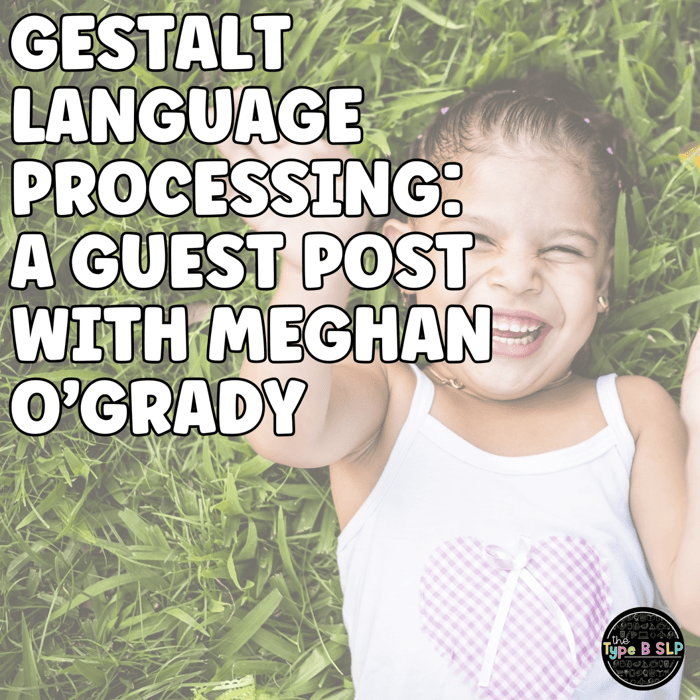
Gestalt Language Processing: Guest Post
Gestalt Language Processing: Guest Post from Meghan O'Grady!
I'm so excited to bring Meghan on today to walk us through Gestalt Language Processing and the NLA framework. This topic has become somewhat of a buzz word over on social media, making its way to many SLPs who are working to understand how speech processes correlate with how autistic adults and children communicate with others. However, despite the recent "buzz," GLP was “named and described by linguist Ann Peters and taken up by SLP scientist Barry Prizant and colleagues,” according to The Informed SLP. It has actually been around since the 1970s!
Meghan is going to break things down for us, especially helpful if you're in the "figuring it out" stage with your GLPs. She's also going to back up and help us find out what to ask caregivers during our detective work process. This will be helpful for those of us going back to school in the fall with a new caseload or new students!
Okay, let's turn this one over to Meghan!
Hi everyone!
I’m Meghan O’Grady, a Brooklyn-based speech therapist and private practice owner passionate about Gestalt Language Processors (GLPs) and Natural Language Acquisition (NLA).
Fun fact: Abby and I currently work together in Brooklyn! Abby and I met through Instagram, where I share about these topics and more, over at @speechlanguageplaynyc if you’d like to follow along!
I am so excited to chat a little today about GLPs and the NLA framework-- topics I feel are essential for every speech therapist to know about!
Let's dive in with the basics:
👉🏼Gestalt Language Processors are people whose first unit of language development is a “chunk,” also commonly referred to as delayed echolalia.
👉🏼Delayed echolalia is language from another source that carries meaning for a GLP, even if that meaning isn’t initially apparent to listeners. Detective work is essential to understand the intended meaning. You might interview the family, watch the child’s favorite shows, or listen to their favorite songs as your detective work.
There are also other ways to determine if a person is a GLP. Some other characteristics to consider are:
- Echopraxia: Delayed echolalia using movements.
- Musical, rich intonation: GLPs are often very musical, some even have perfect pitch. Gestalts will often be characterized by rich intonation.
- Analytic Language strategies have NOT been successful.
- The child initially said a few words but then they stopped using them. These were most likely “stuck single-word gestalts” that the child no longer uses because they don’t carry meaning for the child.
- Once it’s established that a person is developing as a GLP, it’s important to approach therapy through that lens!
NLA outlines six stages of language development for a GLP, and is a helpful guide to treatment planning. Perhaps one of the most shocking aspects of supporting a GLP to those that are unfamiliar with it, is that we want GLPs to use more delayed echolalia in the first stage of NLA! Yep... we want to INCREASE their delayed echolalia gestalts!
We need our GLPs to have a gestalt for a variety of communication purposes, including some of these extremely functional areas of language:
- Commenting
- Rejecting
- Shared joy
- Asking for help
- Transitions
- Joint action routines
- New situations
GLP/NLA is a HEFTY topic with lots of information do dissect, and there’s certainly a lot more to discuss, but if there’s one thing I’d like you to take away today:
Don’t assume that every child you meet is an Analytic Language Processor. Instead, ask questions about the child’s language development and use your clinical judgment to determine the best approach to their language development. Some probing questions that can help you learn more about the child’s language development:
- "Tell me more about your child’s early language development- did they babble and then start saying first words or did you observe it differently?"
- "How does your child communicate with you?"
- "Tell me more about the moments when your child uses language that’s seemingly out of context."
- "What are some of your child’s interests?"
- "Are you familiar with GLPs?"
If you’re interested in reading more about GLPs and NLA, I often write about it in blogs on my website. Check out this blog about Gestalt Language Processing to get started! Thank you to Abby for the opportunity to guest write a newsletter! I’m honored to share a little about GLP/NLA with you all :)
And don't forget you can come find me over on IG at @speechlanguageplaynyc where I'm always sharing more about this topic!
~Meghan
...talk about informative!!! Flag this Gestalt Language Processing blog to save for later, I know you'll want to come back to this one! ❤️❤️
xx, Abby
